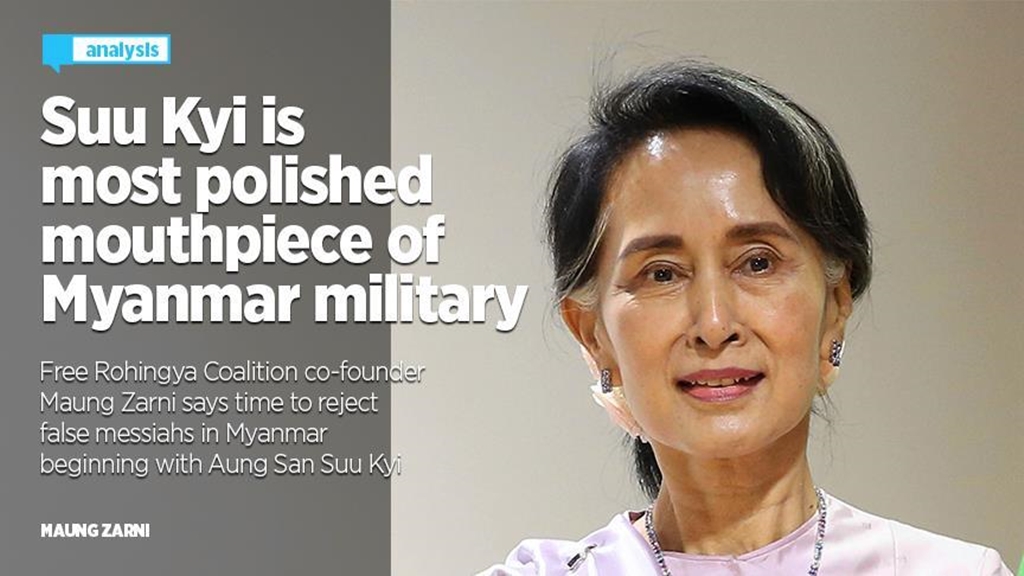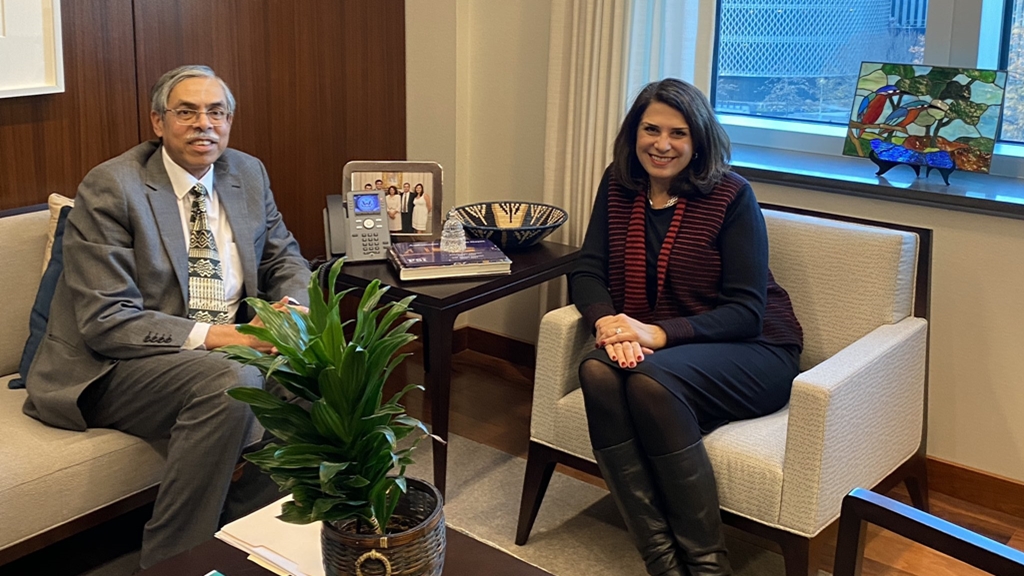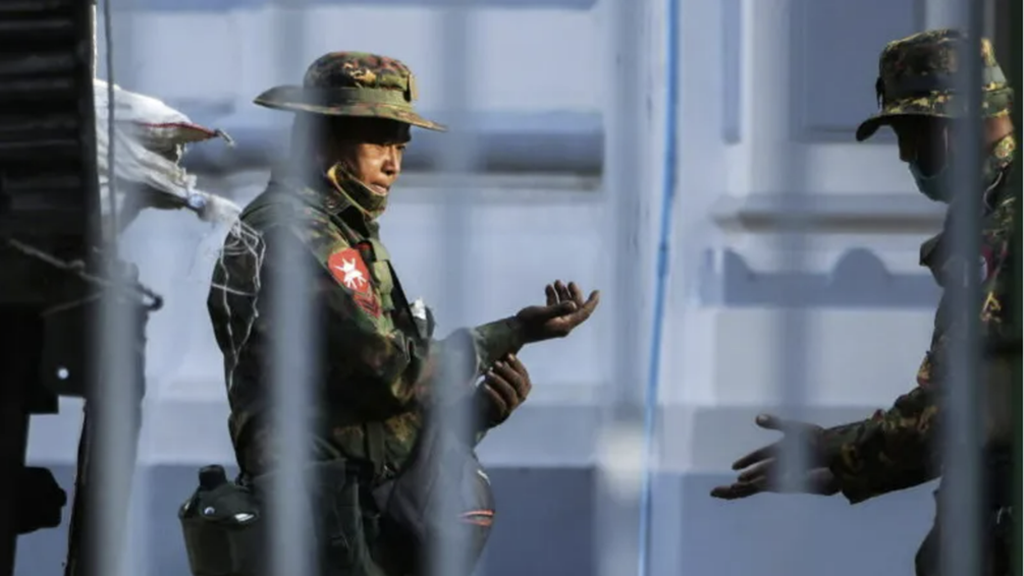
Suu Kyi is most polished mouthpiece of Myanmar military
- 26/11/2019
- 0
By Maung Zarni, Anadolu Agency
Free Rohingya Coalition co-founder Maung Zarni says time to reject false messiahs in Myanmar beginning with Aung San Suu Kyi
Watching YouTube Myanmar State Counsellor’s 43rd Singapore lecture — 1-hour lecture including the questions and answers – entitled, “Democratic Transition in Myanmar: Challenges and the Way Forward,” left me deeply disturbed, pained and outraged.
The degree of her delusions, distortions and concoctions made me realize that my fellow Burmese dissident has become nothing more than the most polished mouth piece for her former captors, namely the murderous military regime.
Aung San Suu Kyi wasn’t simply one dissident leader among several potential leaders of significance that I, like millions of other Burmese Buddhists, supported in those long years of vibrant anti-dictatorship opposition after the nationwide uprisings of 1988.
My sentimental ties to Aung San family is more personal and goes far deeper.
One late great uncle of mine was her father’s next-door neighbor, class mate and a friend at Pegu Hall (dormitory) when both were young undergraduates who hailed together from the Buddhist heartland of the then Upper Burma to study Pali, literature, law, etc. at the colonial Rangoon University in the early 1930’s.
Through my relative’s first-hand accounts of Aung San, the anti-colonial revolutionary and founder of Burma Independence Army under WWII Japan’s fascist patronage, as well as my own study of the slain national hero’s voluminous speeches and writings, I have developed a lifelong admiration for the man’s strength of character, integrity, Marxist-influenced non-racialism and unwavering sense of service to the oppressed of colonial Burma, not just Buddhists nor the majority Burmans or Bama, but all people who considered Burma their home.
In fact, in my high school days in Mandalay of 1970’s I learned the worthy English phrase “love of truth” from one of his writings wherein he pointedly said as a father he wanted to instill the love of truth in his three children.
So, when I watched Suu Kyi’s speech act performed at the Grand Hyatt in Singapore, available on YouTube, I noted with deep pains and rage that my hero’s world famous, or infamous, daughter packed lie after lie – all verifiable – in her prepared lecture, which she proceeded to deliver with a straight face.
Suu Kyi’s Singapore lecture August 22 was a speech her own martyred father would most definitely feel so ashamed about.
Two years since Suu Kyi’s assumption of her self-declared ‘Above-the-President’ office as State Counsellor with her reportedly autocratic control over all ministries save the security-related ministries such as Home Affairs, Defense and Border Affairs, her leadership is noted only for serial failures.
The commissions she has formed to address the country’s defining problem — crimes against Rohingyas — have become a butt of international jokes. As the country’s most revered politician since her father’s murder in 1947, Suu Kyi has been unable to deliver on every one of the party’s official major priorities: “rule of law, peace, development, amendments to the Constitution”.
And yet in the lecture, the NLD leader served up the typically democracy-indifferent and docile Singaporean audience a rose-tinted view of her leadership and governmental performance, which the official hosts on the panel dutifully clapped and heaped praise on.
For someone who grew up under General Ne Win’s “Burmese Way to Socialism” (1962-1988), Suu Kyi’s speech sounded more like a typical party General Secretary’s report to the Socialist Polit Bureau presided over by Chairman (despot) Ne Win in the 1960’s and 1970’s.
The State Counsellor in her own words: “In each of the three panglong (peace) meetings held over the last two years, we made valuable progress. in the First Union Peace Conference, a seven-step roadmap for peace and national reconciliation was achieved. In the Second Conference, 37 principles were adopted. Before the Third Conference, two more ethnic armed groups signed the ceasefire agreement and during the Conference itself, 1“4 more principles were adopted.”
Not only her words are unpersuasive and uncorroborated by the harsh realities of Myanmar ethnic minorities, particularly more than 100,000 Kachin war refugees in the country’s eastern and northern border regions but the world of Myanmar watchers who actually set their foot in these conflict zones offer an assessment radically different from Ms. Suu Kyi’s. Virtually all news reports and field studies about the Burmese military’s internal colonial war of pacification note not only the regression of the country’s peace process under Suu Kyi’s incompetent and failing leadership, typically rich in rhetoric and empty of substance, but also the disappearance of the so-called democratic space even for the ethnically dominant Burman Buddhist public.
That “democratic space” was deliberately allowed by the quasi-democratic regime former General Thein Sein in 2010 designed to tango with the Barack Obama-Hillary Clinton administration as the generals sought to rebalance the military’s overreliance on the increasingly aggressive and invasive China in the Burmese affairs.
The emerging, if belated wisdom in Washington is that the Obama’s Myanmar embracement policy, once held up as one of his signature achievements emboldened, sped up and facilitated the genocidal destruction of Rohingya people.
Under Suu Kyi’s leadership, Myanmar now faces a growing chorus of international calls for the Security Council for the International Criminal Court referral for international crimes in Western Myanmar state of Rakhine, irrespective of whether such calls will bear fruit. Suu Kyi stands accused, with good reasons, of culpability and complicity in the military’s crimes against humanity and even genocide against Rohingya people.
It is matters pertaining to Rohingya persecution — which my researcher colleague Natalie Brinham and I call “the slow burning genocide,” because of its decades-long nature — on which Suu Kyi’s speech act morphed from detectable delusions into deliberate distortions.
With no basis in reality, Suu Kyi boasted of having implemented most of the Kofi Annan Commission recommendations, thus: “(t)he recommendations of Dr. Kofi Annan’s Commission, 88 in all, of which we have to date implemented 81, aim at the establishment of lasting peace and stability in Rakhine.”
Kofi Annan is no more to do the fact-checking. But former ambassador Laetitia van den Assum, one of his fellow Rakhine Commission members, is still alive to know the untruths, nah, outright lies of Ms. Suu Kyi. Van den Assum tweeted “The underlying reasons for their (Rohingyas’) flight remain unaddressed”. The tweet, which can be seen at https://twitter.com/lvandenassum/status/1032527791303139328, came on the eve of the one year anniversary of Myanmar’s large scale military attacks on the unarmed and peaceful Rohingyas in more than 300 villages across northern Rakhine region.
As a researcher who has spent the last six years concentrating on my own country’s decades-long, state-directed persecution of Rohingyas, I find it morally repugnant and empirically false Suu Kyi’s disingenuous framing of the largest refugee crisis her military partners in power have created as initially “terror”-related.
She in effect added insult to the collective injury of the nearly 2 million Rohingya survivors, internally displaced inside Myanmar, internationally deported across the border to Bangladesh, or the diaspora, when she said, “the danger of terrorist activities, which was the initial cause of events leading to the humanitarian crisis in Rakhine, remains real and present today. Unless this security challenge is addressed, the risk of inter-communal violence will remain.”
Suu Kyi words echo how Myanmar military has long framed the Rohingyas — a threat to security — and justified their institutionalized killings of the latter.
For the first 15 years since the country’s popular uprisings in 1988, I had been one of the most hard-working and effective foot soldiers for Suu Kyi in her international campaigns to ostracize and punish Myanmar military leaders.
I have studied closely Suu Kyi’s leadership and poured over every speech of hers, over the last 30 years since she first parachuted onto the Burmese political stage as “the daughter of General Aung San,” as she put it.
Painfully, I have concluded that the daughter of my nationalist hero is no longer part of Myanmar’s solution. For she has for all intents and purposes morphed into the most polished mouthpiece of the military perpetrators.
Suu Kyi even had the audacity to call three generals in her Cabinet “rather sweet” amidst international calls to haul Myanmar generals to the International Criminal Court.
On Aug. 25, 700,000-plus Rohingya survivors of Myanmar genocide in 35 camps in Kutupalong meet to mourn, memorialize and honor loved ones who were senselessly maimed, mass-raped, slaughtered and burned alive a year ago. The least the world, both grassroots communities and governments, could do is to drop the decades-old policy delusions, globally, that Suu Kyi represents hope, liberty and liberalism.
As a Burmese, a dominant Bama, Buddhist from an extended military family at that, I will say for the record Myanmar’s State Counsellor no longer speaks for me.
Nor does she represent the humanistic values which I learned to embrace through her father’s writings. I know for a fact that there are fellow dissidents inside Myanmar, however small their numbers, who share my categorical rejection of Suu Kyi and her military partners in crimes.
Let’s remember Rohingya victims today. And let’s reject false messiahs of Myanmar, starting with Aung San Suu Kyi.
*Opinions expressed in this article are the author’s own and do not necessarily reflect the views of Anadolu Agency.







